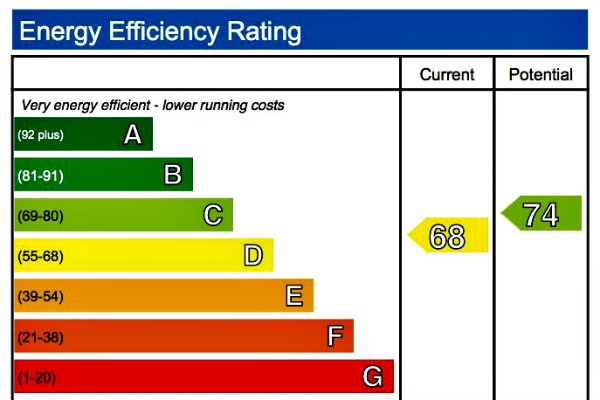An energy performance certificate, or EPC, documents the estimated energy efficiency of your property and its CO2 impact. An EPC is rated using an alphabetic scalefrom A (highest; very efficient) – to G (lowest; very inefficient) and it should also provide an estimate of typical energy costs for the property and suggestions for reducing energy use.
To sell or rent out a property you are legally required to provide an EPC before the property is put on the market and you can be fined if you do not do so. In Scotland this is part of the Home Report which must be compiled by the vendor prior to putting their property on the market. The EPC should also be physically displayedsomewhere in the property, such as the meter or boilercupboard. In England and Wales, the home report, or survey, is the responsibility of the buyer, however the EPC must still be purchased by the vendor.
An EPC must be dated within the last 10 years to show a potential buyer or tenant how energy efficient your home is. If your property has been sold or rented out within the last 10 years, then there may be an existing EPC for the property which is still valid. You can find out via the website for the Ministry of Housing, Communities and Local Government which will display the relevant certificate once you enter your postcode, including valid from and to dates.
Since 1 April 2020, any rental properties must have an energy efficiency rating of E or higher on their EPCwhether they are home to existing tenants or are being marketed for new tenants. The Energy Savings Trustprovides advice on how to make your home more energy efficient.
An EPC can be a major assess when it comes to selling your home and if you have undertaken recent renovations that are likely to have made your property significantly more energy efficient and will gain you a better efficiency rating then it may be useful to undertake a new EPC even if the current certificate is less than 10 years old.
The EPC must be undertaken by a qualified assessor who will undertake a physical assessment of your property and produce the certificate for you. Many estate agents will offer this as an additional service when they are marketing your property, and an EPC will cost in the region of £75-120 depending on the size and type of property. If time is of the essence, then it may be quicker to undertake the EPC via your estate agent who will have a vested interest in getting your property on the market as soon as possible since you cannot market your property without an EPC. However, it can be more cost effective to arrange the EPC yourself, but you need to ensure that the assessor is fully qualified to conduct EPC assessments.
In England, Wales and Northern Ireland, you can find a list of accredited assessors here: https://getting-new-energy-certificate.digital.communities.gov.uk/
For Scotland, a list of accredited assessors can be found here: https://www.scottishepcregister.org.uk/assessorsearch
There are a few instances where a property does not require an EPC, which are as follows. However, manyexemptions relate to non-residential buildings only.




